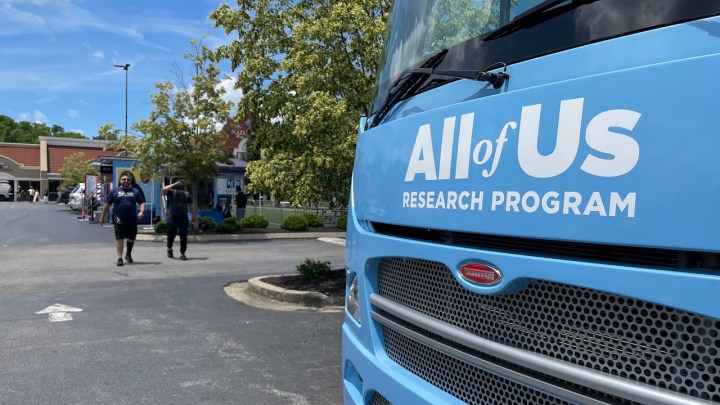
To boost diversity in clinical trials, NIH takes to the road to collect DNA from underrepresented groups
To boost diversity in clinical trials, NIH takes to the road to collect DNA from underrepresented groups

Americans of European descent make up the majority of participants in clinical drug trials. As a result, modern medicine has missed some things — like the recent revelation that pulse oximeters don’t work so well on darker skin.
The National Institutes of Health is trying to create the world’s most diverse data bank of DNA and medical records, with the goal of improving health care for everyone. But the pandemic paused in-person recruiting of 1 million participants. Now, the so-called All of Us project has relaunched its bus tour — hitting cultural festivals and senior centers across the country.
“Being in-person for us is key,” said Edgar Gil Rico, managing director of the National Alliance for Hispanic Health. “We have to make those cultural connections.”
Gil Rico helped identify the Plaza Mariachi in Nashville, Tennessee, as a collection site in June.
“I get here, somebody hears my accent. They’re like, ‘Oh, you’re from Colombia? I’m also from Colombia.’ Then, we’re going to end up talking about how we got here,” he said. “That’s how the culture works.”
This diverse data bank is meant to provide big data-crunching potential and supply participants for clinical trials. Taxpayers have already committed more than $1 billion through the NIH. But it requires something scientists don’t do enough of: getting out of the lab.
At the Nashville stop, outreach manager Mäe Sandberg — shaded by a straw hat under a nylon tent — assisted Maretza Castro, originally from Nicaragua, who walked up after hearing about the project in the Spanish-language media.
Castro was ready to board the bus and offer samples of her blood and urine, along with electronic medical records, despite being a little fearful of how her health information and genetic material will be used.
“Of course I’m afraid, but I know that this is good for other people,” Castro said in Spanish. “It might be a personal inconvenience, but I’m here in this country.”
Castro also said she’s interested in the report participants can get on their genetic risks.
She joins more than 350,000 participants across the U.S. who have granted access to their medical records, submitted body measurements and donated at least one biospecimen. Nearly 17% identify as Hispanic or Latino — roughly aligning with the U.S. population.
Organizers say the data, which is managed by Vanderbilt University, is extremely secure, though breaches are always a risk. The scientists who apply to use the data must be vetted.
While improving the diversity of research is the goal, Sandberg said informed consent from the participants is a must.
“That’s why it takes some time. We want to make sure that people are aware what they’re sharing,” she said. “They can say yes or no.”
Zoom events don’t help build adequate trust when asking people from marginalized communities to share every bit of data about their health and humanity, especially given the history of exploitive research in some communities. But through the pandemic, up until a few months ago, the outreach was entirely virtual.
Participants can fill out the extensive surveys online and even offer DNA samples through private lab companies. But that kind of reliance on technology risks attracting the usual clinical trial participants. Beyond racial and ethnic diversity, this project targets anyone underrepresented in bioresearch, which includes seniors.
“There are some barriers that older adults might face around digital divide,” said Gretchen Funk of FiftyForward, one of the more than 100 nonprofits partnering with the NIH.
When the concept is fully explained face to face, Funk said, seniors are receptive. So far, roughly 40% of participants are over age 60.
“They want to leave a legacy. They want to consolidate their experiences over their lifetime and leave something for the future generation,” she said.
The data bank has already yielded valuable research. It found COVID-19 was in the U.S. weeks before the first reported cases because some of the blood samples already had antibodies.
There’s a lot happening in the world. Through it all, Marketplace is here for you.
You rely on Marketplace to break down the world’s events and tell you how it affects you in a fact-based, approachable way. We rely on your financial support to keep making that possible.
Your donation today powers the independent journalism that you rely on. For just $5/month, you can help sustain Marketplace so we can keep reporting on the things that matter to you.

















